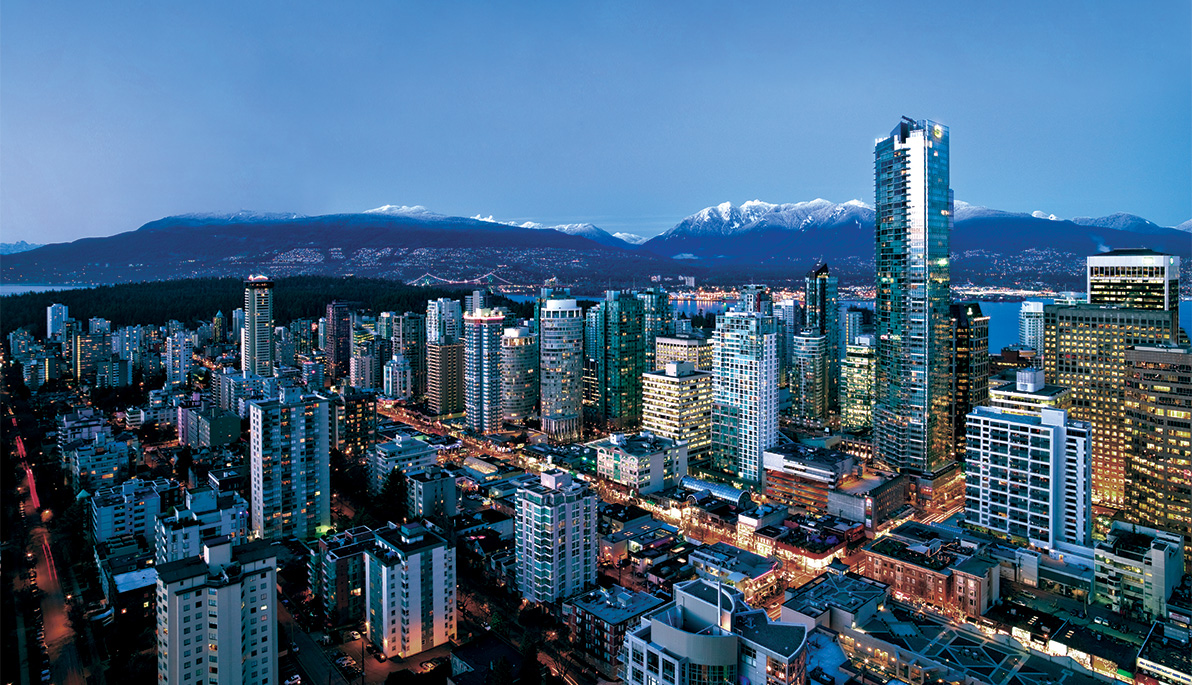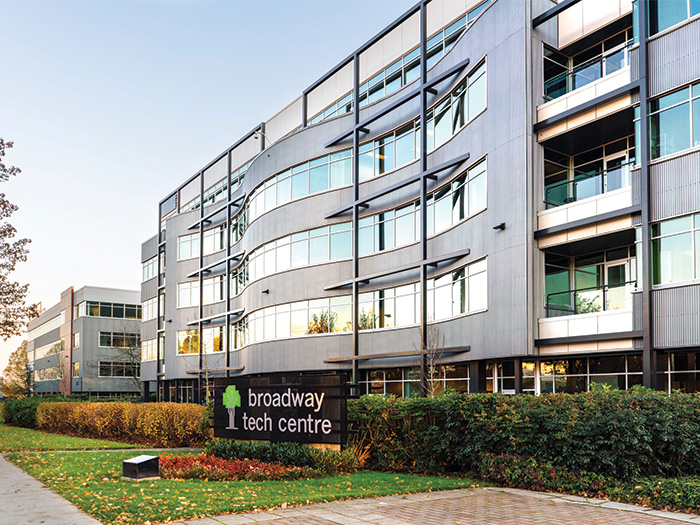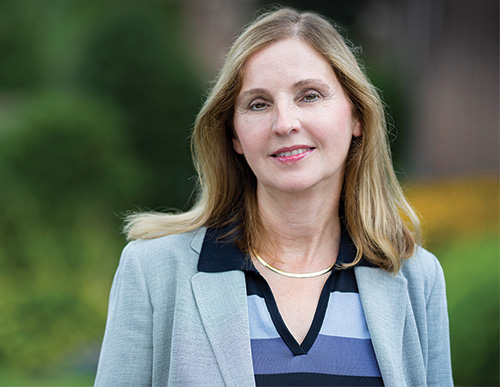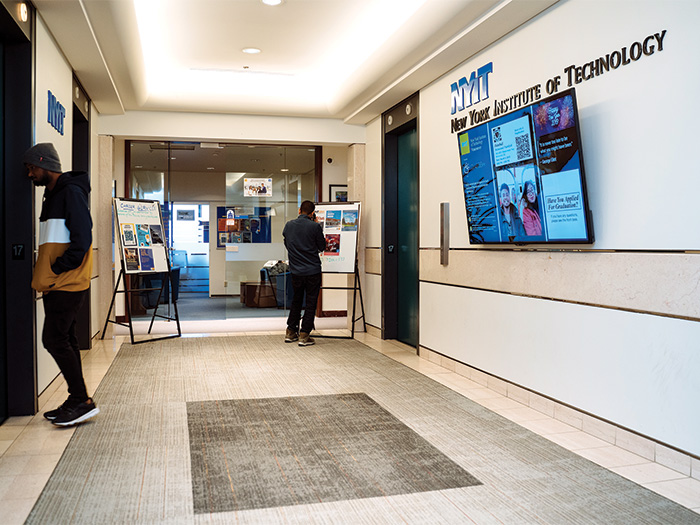
A Natural Beauty: NYIT-Vancouver
July 19, 2019
Nearly two decades ago, NYIT headed west and began offering an M.B.A. Degree in Vancouver, Canada. Today, the campus boasts two locations, five graduate degrees, and hundreds of students, faculty, staff, and alumni who are contributing to the life and legacy of the city between the mountains and the sea.
When Irene Young became dean of New York Institute of Technology’s campus in Vancouver in November 2016, the school had just over 150 students total. Today 730 students are pursuing their M.B.A. and M.S. degrees. Energy management alone has grown from three students to 160, and the 358 members of the Class of 2019 represented the largest graduating class in the campus’s history.
The excitement around NYIT-Vancouver has been driven by an enthusiastic administration, engaged faculty and alumni, and intellectually curious students. “We are a global campus,” says Young. “Most of our students come from outside of Canada and the United States. I see their commitment, along with NYIT’s desire to build pathways to success for these students and alumni, as drivers in the school’s achievements.”
Hank Foley, Ph.D., president of New York Institute of Technology, agrees. “It’s because of our incredible faculty and staff that this campus has experienced an unprecedented growth in enrollment—276 percent in the past two years alone.”
Putting Down Roots
Vancouver is a place known for both its vibrant city center and its stunning surroundings. NYIT’s campus sits at the heart of it all. Students regularly spend time together enjoying the natural beauty of the area, getting to know the culture, visiting companies, and volunteering. The fact that graduate students from disparate programs have formed such a close-knit community may come as a surprise, but NYIT-Vancouver is committed to supporting its students and to cementing itself as an asset to the city.
Originally, the university established its presence in downtown Vancouver, but with the growth in enrollment over the past three years, it quickly ran out of room. In 2018, the campus opened its second location in Broadway Tech Centre across town. The new space accommodates the 207 students pursuing an M.S. in Cybersecurity—British Columbia’s only cybersecurity graduate program. And while NYIT expands its footprint physically, it continues to maintain its supportive atmosphere. Young has brought together a core group of professors with expertise in the industries students seek. “We encourage faculty to teach and do research,” Young says, “and so we are able to get some of the best.”
Faculty also serve as mentors to students, encouraging them to be engaged and immerse themselves in the community. “It’s not a big machine,” says Sinan Caykoylu, Ph.D., associate dean and assistant professor of Management. “It’s cozy and casual. All of the business faculty are on the same side of the building. Students can walk to my office or catch me in the corridor.” That dynamic helps students, especially those from other countries, to develop strong interpersonal connections.

Degrees That Meet Demand
Part of NYIT’s mission is a commitment to educating students for innovative, emerging fields. “The future is bright for NYIT doers, makers, and innovators seeking careers in British Columbia—or anywhere in the world—and we are excited to see that Vancouver is witnessing the fastest-growing tech workforce and startup ecosystem in Canada,” says President Foley. That means fields such as cybersecurity and energy management continue to strengthen in the region and even have the potential to rival existing industries like finance.
NYIT-Vancouver excels in preparing graduates to fill upwardly mobile positions within all these industries. “The business world needs people at the middle level. Not everyone is going to zoom up to the executive level,” explains Caykoylu. By prepping students for these types of jobs within their chosen fields, the school gives students a head start on the path toward advancement and success. That strategy also distinguishes NYIT-Vancouver from its local competitors. “[The University of British Columbia and Simon Fraser University] are primarily research institutions,” Caykoylu explains. “And they’re more expensive than NYIT.”
Tokunbo Makanju, assistant dean and assistant professor of Computer Science, adds that students do not have to fit into traditional categories either. “In [Cybersecurity], most of the students do not necessarily have a computer science background. They have an interest in cybersecurity, but they are not interested in getting regular master’s of computer science degrees.” Through the school’s custom degrees, he says, “we ensure that our classwork is relevant to current needs and trends in the industry.”

Irene Young
Let’s Be Real
Experiential learning plays a large role in preparing students for careers. “In each of Vancouver’s graduate programs, faculty members strive to introduce opportunities for students to apply the learning from their classes to real-world situations,” explains Logan Lorenz, associate director of Student Affairs and Career Services. And because the majority of students are from other parts of the world, NYIT stresses the importance of building contacts in the community. “We’re realistic from the first day,” Caykoylu says. “We tell them it will be an uphill challenge. They’ll have to work harder [than Canadian students] and they’ll have to do more networking.” The result? “Our students respond and prepare accordingly. They tend to get jobs within six months of graduation.”
Like many international students, Victor Badejo (M.S. ’17) chose NYIT-Vancouver for its career opportunities as well as its welcoming environment. “Victor is well-connected, and he’s a great speaker,” Young says. “He’s very engaging.” A native of Nigeria, Badejo immediately got involved in the life of the campus and the city. He served in the Graduate Student Association and as a student assistant for Information Technology (IT) administration, and he networked through organizations like the Vancouver chapter of ISACA.
“Vancouver is immigration-friendly,” Young says. “After two years of education, an international student can often get a work visa and be on the path to permanent residency.” What’s more, Vancouver is relatively small compared to other global cities yet boasts many of the same offerings as far as employment and lifestyle. Microsoft, Amazon, and Google are all represented here, along with several international banks. As for Badejo, he got a job in Vancouver with Best Buy as a cybersecurity analyst right after he graduated, and he recently joined PwC as senior associate of Cyber Risk.
The college’s reputation for producing highly employable graduates bodes well for the city and its student population.
“Twenty-four hours after I finished my M.B.A., I was already working full-time at a health-care college,” says Miranda Cabiladas (M.B.A. ’18), who also worked at NYIT-Vancouver while she was a student and is an accomplished photographer. (Her photo of students kayaking graced the cover of the fall 2017 issue of NYIT Magazine.) “This speaks volumes not only about the diverse employment opportunities available for M.B.A. graduates, but also about the quality of education that NYIT-Vancouver provides.”
Valentina Lameda (M.B.A. ’18) agrees. “My experience was great because I was always participating as a volunteer, student assistant, and in any way I could to network and get to know people from the community,” she says. Lameda took a position as an assistant for financial firm RBC Dominion Securities after she graduated and received her Canadian Securities Course certification.
Building a Legacy
Alumni like Badejo, Lameda, and Cabiladas provide tangible examples of the merits of an NYIT-Vancouver education. It’s no surprise then that the college and its graduates form lasting ties. “I remain connected with many of the administrative staff who are still working at NYIT,” Cabiladas says.
Sometimes, graduates find that the ideal job for them after graduation is right on campus. Sharon Raj (M.B.A. ’15) serves as business administration manager and helped launch the Broadway Tech Centre location. “From May to November 2018, my role was about setting everything up in the facility,” she says. “It was fun, and it looks great.”
Raj, a native of India, had long wanted to live in Vancouver. NYIT provided her a chance to fulfill that dream and pursue her career in business. “They gave me the option of being able to get an M.B.A. without having a lot of previous work experience,” she says.
Flexibility is just one way NYIT-Vancouver creates unique opportunities to attract new students. Another is adding programs geared toward emerging careers. “In 2016, NYIT launched a Master of Science in Environmental Management,” says Remi Charron, associate professor in the Department of Energy Management. “We have a good group of faculty connected with different aspects of the industry. We’re giving students a knowledge base in our discipline that they can apply to other challenges in their careers. One of our graduates from last summer is working with a company that does lighting energy upgrades and seems to really enjoy it.”
NYIT-Vancouver students also benefit from connections to the New York campus. “They have been so helpful,” Young says. “We rely a lot on the communications, marketing, and admissions staff. And we are bringing New York faculty here so our students can experience their expertise.”
Recently, the campus welcomed guests like Paolo Gasti, Ph.D., associate professor of Computer Science and a cybersecurity expert, and Babak Beheshti, Ph.D., dean of NYIT College of Engineering and Computing Sciences. Young has plans to invite more faculty to the campus, including those like Melda Yildiz, Ed.D., associate professor of Instructional Technology, to share expertise on global education.
“I would also like Vancouver faculty to teach in New York,” Young says. “I want to continue to grow that relationship.”

And she is devising ways to make New York Institute of Technology more recognizable in the Vancouver area. One important step, she says, is a more prominent physical presence. “The public institutions here are very competitive, so from a domestic standpoint we need to do more. Right now, we are split into the downtown campus and the Broadway Tech Centre campus. Longterm, we’d like to consolidate locations and have a building with our own front door.”
With increasing enrollment, favorable attention to academic offerings, and a talented faculty encouraging ongoing opportunities, it seems likely that Young’s long-term goals for NYIT-Vancouver will be realized. “I think we’ve proven that we’ve got a future here,” she says.
This article was originally published in the Spring 2019 issue of NYIT Magazine.
Learn More: nyit.edu/vancouver

More Features

An Alumnus’ Commitment to the Environment
As an energy management graduate from New York Tech’s Vancouver campus, Jasdeep Gulati (M.S. ’22) is highly invested in educating people about environmental and climate sustainability.

Vancouver Faculty Win University-Sponsored Research Awards in New Program
The new Global Impact Research Grant (GIRG) program has been developed to keep Vancouver-based faculty connected to faculty and research projects being conducted on the university’s New York campuses.

Studying Climate Change One Degree at a Time
Junhua Qu (M.S. ’24) began her collegiate journey in Beijing. But, her interest in climate change took her to New York Tech’s Vancouver campus to study energy management.
